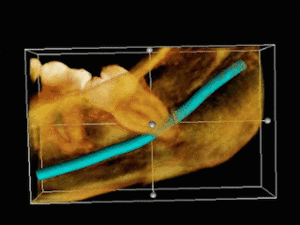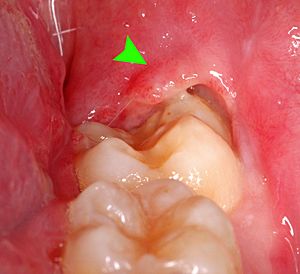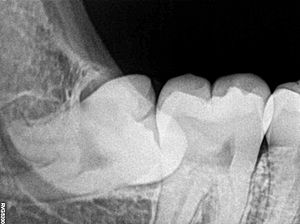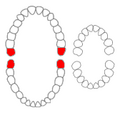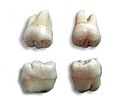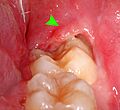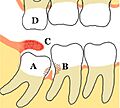Wisdom tooth facts for kids
Quick facts for kids Wisdom tooth |
|
|---|---|
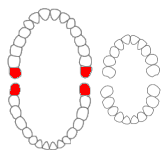 |
|
| Wisdom teeth in the human mouth for permanent teeth. There are none in deciduous (children's) teeth. | |
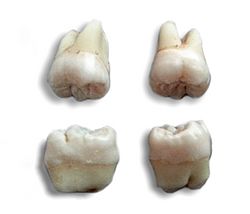 |
|
| Wisdom teeth |
A wisdom tooth is the very last tooth at the back of your mouth. Most people have four wisdom teeth, one in each corner of their mouth. They are also called third molars because they are the third set of large grinding teeth.
Wisdom teeth usually start to appear, or erupt, when you are between 17 and 21 years old. This is why they are called "wisdom" teeth – because you are older and supposedly "wiser" when they come in!
Sometimes, there isn't enough space in your mouth for wisdom teeth to come through properly. When this happens, they can get stuck against other teeth or your jawbone. This is called an impacted wisdom tooth. Impacted wisdom teeth can sometimes cause problems like tooth decay or infections. Because of this, dentists often suggest removing them.
Contents
What are Wisdom Teeth?
Wisdom teeth are the last teeth to grow in your mouth. They are designed for chewing food. While most adults have four, some people might have fewer, more, or even none at all! If you have extra teeth, they are called supernumerary teeth.
How Wisdom Teeth Look
Wisdom teeth can look a bit different from person to person.
- Upper wisdom teeth: These teeth often have a triangular top surface with many small grooves. Their roots, which are the parts of the tooth hidden in your jaw, are often joined together and can be oddly shaped.
- Lower wisdom teeth: These are the smallest of your molars. They usually have a rounded, rectangular top with four or five bumps, called cusps. Their roots are also often smaller and can be fused together.
When Wisdom Teeth Erupt
The age when wisdom teeth appear can vary a lot. Generally, they come in between 17 and 21 years old. For some people, they might start to erupt as early as 13. If they haven't appeared by age 25, dentists usually think they won't come in on their own. The roots of these teeth can keep growing for up to three years after the tooth has appeared.
Why Do We Have Wisdom Teeth?
Scientists believe wisdom teeth helped our ancestors chew tough foods. Early humans ate things like raw fruits, leaves, roots, nuts, and meat. These foods needed a lot of chewing power!
Over thousands of years, human diets changed. We started cooking food and using tools to cut it into smaller pieces. This made food much easier to chew. Our jaws also started to grow a bit differently, becoming smaller. This often means there isn't enough room for wisdom teeth to come in without problems.
Problems with Wisdom Teeth
Wisdom teeth are often the teeth that cause the most problems in the human mouth. When they get stuck, or impacted, they can lead to several issues.
Common Issues
- Tooth decay: It can be hard to clean impacted wisdom teeth properly. Food and plaque can get trapped, leading to cavities.
- Infections: If a wisdom tooth only partially comes through the gum, it can create a flap of gum tissue. Food and bacteria can get stuck under this flap, causing an infection called pericoronitis. This makes the gum red, swollen, and painful. It can even cause bad breath or make it hard to open your mouth wide.
- Cysts: Less commonly, a fluid-filled sac called a cyst can form around an impacted wisdom tooth. These are usually harmless but might need to be removed.
Keeping Your Wisdom Teeth Healthy
Good oral hygiene is important for all your teeth, including wisdom teeth. Brushing your teeth twice a day and using dental floss or small brushes between your teeth helps prevent plaque buildup. This can reduce the risk of problems with your wisdom teeth.
Removing Wisdom Teeth
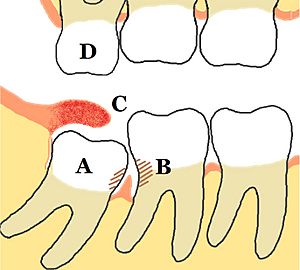
Dentists often suggest removing wisdom teeth if they are causing problems like pain, infection, or decay. Sometimes, they might suggest removing them even if they aren't causing problems yet, to prevent future issues. However, some experts believe that healthy, problem-free wisdom teeth should not be removed unless necessary.
If you have an impacted wisdom tooth that is causing trouble, your dentist might suggest:
- Cleaning the area and using salt water rinses for infections.
- Giving you antibiotics to fight infection.
- Removing the gum flap over the tooth.
- If these don't work, the tooth might need to be extracted.
Recovery After Surgery
After a wisdom tooth is removed, especially a lower one, your dentist might use something called platelet-rich fibrin (PRF). This is made from a small sample of your own blood. It can help the area heal faster, reduce pain and swelling, and lower the chance of getting a "dry socket," which is when the blood clot falls out of the tooth socket too early.
Risks of Surgery
Removing lower wisdom teeth can sometimes affect a nerve called the inferior alveolar nerve (IAN). This nerve gives feeling to your lower lip and chin. Damage to this nerve can be temporary or, in rare cases, permanent. Dentists are very careful to check how close the wisdom tooth is to this nerve using X-rays before surgery.
Do Wisdom Teeth Cause Crowding?
For a long time, some people thought that wisdom teeth pushing forward caused the front teeth to become crooked or crowded. However, recent research shows that wisdom teeth alone probably don't cause this. Crowding of front teeth is usually due to many different things, like the size of your teeth, how your jaw grows, and other factors.
History of Wisdom Teeth
The name "wisdom tooth" comes from the Latin words dens sapientiae, which means "tooth of wisdom." This is because they appear much later in life than other teeth, when people are thought to be wiser.
Even thousands of years ago, people knew that wisdom teeth could cause problems. The ancient Greek philosopher Aristotle wrote about them appearing in people as old as 80!
Impacted wisdom teeth were not very common until more recent times. After the Industrial Revolution, when people started eating softer, processed foods, jaw sizes changed. This led to less space for wisdom teeth, making impaction much more common than it used to be.
Images for kids
-
Some problems that can happen with wisdom teeth: A A lower wisdom tooth stuck at an angle. B Cavities and gum disease on the wisdom tooth and the tooth next to it. C An inflamed gum flap over a partially erupted wisdom tooth. D An upper wisdom tooth that has grown too far down because there's no tooth below it to bite against.
See also
 In Spanish: Muela del juicio para niños
In Spanish: Muela del juicio para niños
 | William L. Dawson |
 | W. E. B. Du Bois |
 | Harry Belafonte |


